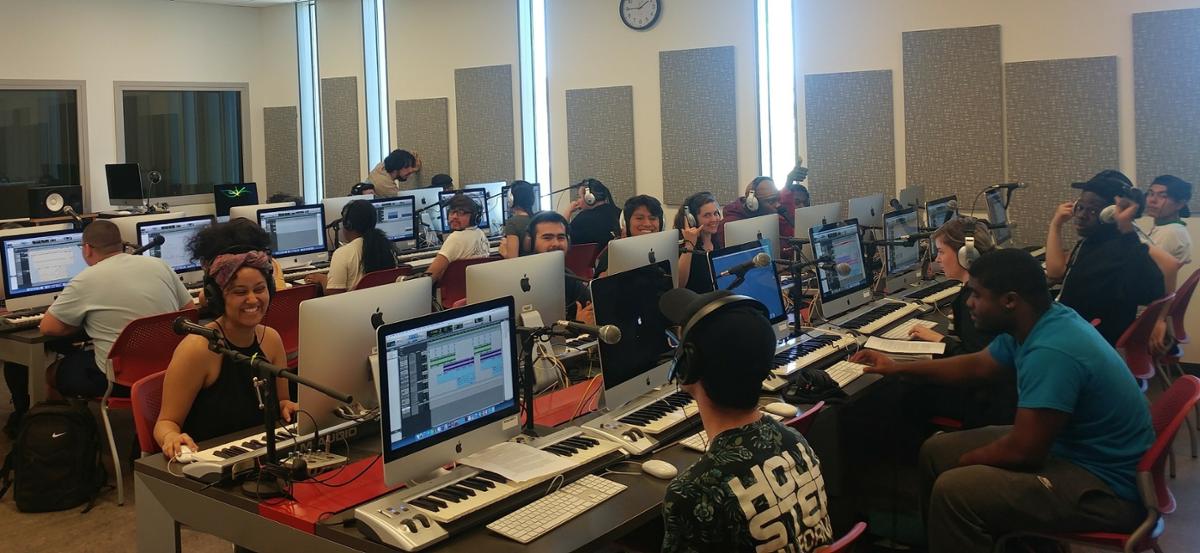Audio and Music Technology

Audio and Music Technology
The Associate of Arts Degree in Audio and Music Technology is designed to prepare the student for transfer to institutions of higher education and specifically intended to satisfy the lower division requirements for the Baccalaureate in Arts or Science Degree in Music Industry Studies, Music Technology, or Recordings Arts at a California State University (but does not guarantee acceptance to a particular campus or major). The degree is designed to prepare students to demonstrate competence and discipline in the study of music theory, musicianship, music technology, music production, music creation, and entrepreneurship in music. It will also provide the student with a sufficient academic basis from which to pursue a career in the music industry. Completion of this curriculum will demonstrate commitment to the serious study of music and audio production and will provide comprehensive preparation for upper-division course work.
Program Learning Outcomes
Upon successful completion of this program, students should be able to:
-
Identify, read, and write intermediate rhythms, scales, key signatures, melodic and harmonic intervals, and chords.
-
Demonstrate the ability to hear, identify and work conceptually with the elements of music.
-
Demonstrate keyboard proficiency at the level required to perform theoretical concepts studied in music theory courses.
-
Establish oneself as an instrumentalist and/or vocalist suitable for entry into college/university-level applied lessons and ensembles.
-
Critique musical performances and recordings with an awareness of vocabulary, musical style, performance practice, and interpretation.
-
Analyze and synthesize musical content for social, cultural, aesthetic and historical significance.
-
Demonstrate multi-track digital audio workstation (DAW) skills specific to MIDI and audio sequencing and composition.
-
Create original and derivative works in recorded or written form.
-
Network and collaborate with peers on musical projects.
-
Understand the values, ethics, and economic factors that influence the music industry.
-
Identify opportunities for expanding creative, innovative, and entrepreneurial skills in the music industry.
-
Apply relevant knowledge, skills, and habits of mind to seek career opportunities in the field.
| Required Courses (34 units) | Units | |
| ECO-4 | Introduction to Economics | 3 |
| MUS-3 | Fundamentals of Music | 4 |
| MUS-4 | Music Theory I | 4 |
| MUS-5 | Music Theory II | 4 |
| MUS-8A | Music Technology I | 3 |
| MUS-8B | Music Technology II | 3 |
|
MUS-30 |
Class Voice or Class Piano III or Class Guitar |
1 |
| MUS-30 or MUS-32D or MUS-37 |
Class Voice |
1 or 1 or 1 |
| MUS-32A | Class Piano I | 1 |
| MUS-32B | Class Piano II | 1 |
|
MUS 89/89H |
Music of Multicultural America / Honors Music of Multicultural America | 3 |
| MUS-98 | Careers in Music | 3 |
| MUS-101 | Introduction to Music Technology | 3 |
| Elective Courses (5 units) | Units | |
| CIS-26A | Cisco Networking Academy 1A | 4 |
| FTV-67 | Introduction to Video Production | 2 |
| FTV-72 | Introduction to Lighting Design for Film and Television | 3 |
| THE-48 | Theatrical Lighting Design | 3 |
|
MUS-9 |
MIDI/Digital Audio Composition and Film Scoring | 3 |
|
MUS-10 |
Digital Music Production and Mixing | 3 |
|
MUS-11 |
Sound Recording Techniques I | 2 |
|
MUS-P11 |
Live Sound Techniques I | 2 |
|
MUS-P52A |
Songwriting I | 2 |